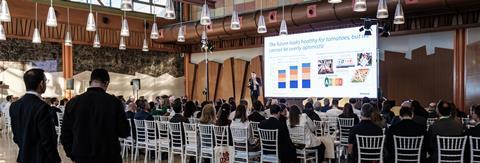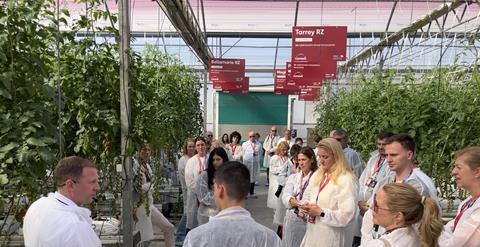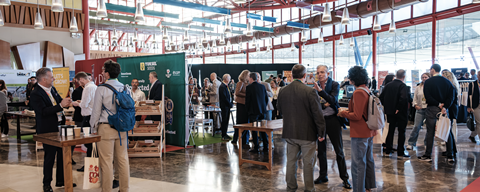Tomato experts gathered in the Spanish city of Malaga this week for Fruitnet Tomato Congress, a two-day event highlighting the big future challenges facing the category, as well as the opportunities and solutions for businesses

Fruitnet Tomato Congress took place in Malaga, Spain, on 11-12 November, bringing together more than 200 professionals from across the tomato business and from over 20 countries, with the aim of making contacts and exploring what the future holds for fresh tomatoes.
Together with growers, seed firms, marketers and technology companies, representatives from some of the tomato market’s leading buyers were also present, including Carrefour, Tesco, Bama and Marks & Spencer.
The first day’s conference featured topics ranging from changing sources of supply, evolving consumer expectations and increasing technological sophistication, to the key challenges of climate change, labour cost and availability and geopolitical uncertainty.
Rabobank’s Lambert van Horen set the scene, introducing the key challenges ahead, including increasingly extreme conditions for producers in southern Europe and North Africa and the growing prevalence of pests and diseases.
Andriy Yarmak of the Food & Agriculture Organisation confirmed North Africa’s position as a powerhouse in the supply of tomatoes to Europe through Morocco, Tunisia and Egypt, while highlighting the emergence of the likes of Turkey and Turkmenistan.
Predicting the European market of 2030 and beyond, Jordi Ballester of Letitout Food Creativity pointed to greater variety on the shelves, whether that be in colour, shape, size or taste, but he stressed that quality and price would undoubtedly remain the determining purchasing factors in the foreseeable future.
Looking in the mirror
Jim Jefcoate of the UK’s Hurdletree Associates and Clara Romero of Spain’s FoodExperts warned of the looming requirements for tomato growers when it comes to carbon and water footprinting. “The question is, do producers realise what’s coming in terms of regulation,” wondered Jefcoate, “and will all this lead to a tsunami of bureaucracy and audits?”
Kacem Bennani Smires of Morocco’s Delassus/Duroc spoke about the producer’s journey to becoming a B Corp company, encouraging other firms to follow suit in “taking a proper look in the mirror” when it comes to the whole gamut of sustainability commitments, both environmental and social.
Seed companies, including Rijk Zwaan, Hazera, HM Clause, Yuksel Seeds and BASF-Nunhems were on hand to provide an update on the development of tomato varieties that provide not just resistance to ToBRFV, but also weather extremes, while crucially meeting consumer demands for excellent taste.

Meanwhile, technology companies responded to the question of whether technology can fix the big challenges facing the category. With labour issues coming out a firm winner in a poll of delegates on the day, Ben Pieterse of TTA-ISO introduced the Dutch firm’s automated solutions for harvesting and grafting. He revealed that interest in such solutions was on the rise even in countries where cheap labour is abundant, as demands for higher quality and greater consistency increase.
The use of AI and big data was highlighted by Max van den Hemel of Delphy for its potential to improve efficiency, predict issues and maximise yields, while Lena Maas of Hudson River analysed the prospects for gene-edited tomatoes in the European market.
The second day saw delegates pay a visit to the facilities of Rijk Zwaan, Unica Group and Granada La Palma to witness first-hand what goes into the development of new tomato varieties and tomato-based products such as the latter’s meat-free burgers, as well as the evident commitment of the category to the most sustainable approaches to production.

Topics
- Africa
- Asia
- Belgium
- Canada
- Climate change
- Consumers
- Convenience
- Egypt
- Environment
- Ethical trade
- Europe
- Events
- Food waste
- France
- Fruitnet Tomato Congress
- Germany
- Greece
- Health
- Local Sourcing
- Logistics & Cold chain
- Marketing
- Markets
- Morocco
- Netherlands
- North America
- Norway
- Organics
- Poland
- Portugal
- Production & Trade
- Research & Development
- Retail
- Spain
- Supply
- Sustainability
- Tariffs
- Technology
- Tomatoes
- Tunisia
- Turkey
- Turkmenistan
- United Kingdom
- United States
- Vegetables
- Vertical farming
- Wholesale



